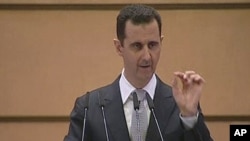Syrian President Bashar al-Assad has again promised both reform and retaliation in response to the unrest roiling the nation. Assad also added the Arab League to the list of groups fueling Syria's problems.
In his first speech since June, President Assad remained defiant, blaming foreign interference for the turmoil, while claiming he retained the support of his people. He vowed he would deal with "terrorists" with an "iron fist" - a reference to those opposed to him who, in addition to peaceful protesters, have increasingly included armed military defectors.
Assad denied ordering security forces to shoot at civilians, saying there is no order at any level to do so. He also blamed foreign news sources for spreading lies. The government has strictly controlled media coverage, but countless amateur reports have shown troops firing on unarmed protesters.
|
Syrian President Bashar al-Assad said in a 100-minute speech in Damascus... |
|
The two-hour speech, aired on state television, offered a familiar mix of apparent concessions along with renewed threats.
The president raised the possibility of a referendum on a new constitution and called for a broader-based government, 40 years after his family came to power. He also vowed that a national dialogue would begin shortly, though he has promised, and failed to hold, inclusive talks before.
In addition to criticism of the West, Assad had harsh words for the Arab League, which has suspended Syria and now has sent a team to monitor whether Damascus is keeping its promise to end the crackdown.
Even as the president spoke, demonstrations continued in other cities, and Kuwaiti media reported that several of its league monitors had been attacked and injured the day before.
Opposition forces used Twitter to send videos of people slapping televisions carrying the speech with their sandals, while others documented the ongoing violence.
One opposition activist, Haitham al Maleh, watching the address from his base in Turkey, dismissed the promises Assad made.
"My reaction is that all his speech is a kind of propaganda and made up of lies. He wants to say to the international community and to the Arab world that he is good and he is going to change, but he will not. He is not going to do anything differently," said the activist.
Political analyst Nadim Shehadi of London-based Chatham House questions how long Assad can keep up the defiant front.
"The way I interpret the speech is that the regime in effect cannot really recognize or acknowledge a real crisis. It's a regime that can only look absolutely strong until the last minute, and then it will break down," said Shehadi.
The United Nations estimates 5,000 people have been killed in the 10 months of unrest. Some outside Syria, including Turkey's leaders this week, have expressed fears the situation is nearing civil war.
| Join the conversation on our social journalism site - Middle East Voices. Follow our Middle East reports on Twitter and discuss them on our Facebook page. |
















